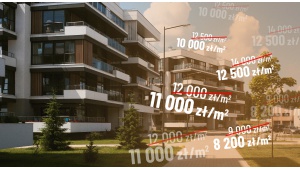Polish construction industry resistant to COVID-19? Latest stock market reports
BuzzAir
ul. Niekłańska 35/1
03-924 Warszawa
maurycy.nosowski|buzzair.pl| |maurycy.nosowski|buzzair.pl
+48 22 402 96 10
www.corepr.pl
The construction sector contributes EUR 64 billion in value added, or 16.8 percent of total GEP in Poland, and it is a key driver for the development of the Polish economy. Construction companies produce 7.4 percent of GDP directly, however through indirect effects generate an additional 9.3 percent of GDP. This industry directly creates 6 percent. of the total employment figures-and indirectly a total of 15 percent, or 2 million 90 thousand people additionally in work. The introduction of restrictions related to the pandemic in March had a negative impact on the sale and hand-over of properties to buyers. During this period, development companies and real estate agencies recorded a drop of between 40% to 70% in transactions.
Undoubtedly, the crisis has changed the market rules. So far high demand meant that flats have sold easily. Undoubtedly, the crisis has changed the market rules. So far high demand meant that flats had been selling easily. Now, it would seem that firms should begin battling to keep their clients seemingly feigning interest. World Bank economists forecast that the pandemic will lead to a general slump in the growth of the Polish economy from 4.1 percent recorded in 2019 to 0.4 percent forecast for 2020, though the economy is now expected to reach a dismal 2% growth figure next year.
During-lock-down in Poland, construction has not been closed, moreover the government announced large development investments for the sector as part of the 'anti-crisis shield'. Analyzing the latest results of real estate companies listed on the Warsaw Stock Exchange, we can observe some common market trends affecting property prices. Since the previous crises in 2001 and 2008-2009, a number of safeguards have been introduced that are currently impacting sector stability. During the lock-down period, the industry reported quite similar threats. In Poland, banks provide protection in the event of a developer's bankruptcy.
An important indicator of profitability for developers is the gross margin on sales, i.e. how much the developer look to earn prior to any general management and sales costs. This shows how well the company can organize construction – buy the land cheaply, find a good contractor, and finally sell the project to customers.
As the index of WIG20, mWIG40 and sWIG80 indices show, we can see 8 developers who can be divided into two basic groups: residential and commercial real estate companies. Polnord, Dom Development and Atal are housing developers. Conversely, GTC, MLP Group and PHN deal with commercial real estate. LC Corp and Echo, are the firms that hold the largest significant share of both segments.
The „WIG-NRCHOM” is the Warsaw Stock Exchange index for real estate (a sectoral sub-index of the WIG main index). It currently comprises 28 companies that meet the baseline criteria and are allocated to the sector. Five leading companies account for as much as 72.54% of the WIG-NRCHOM portfolio. The leaders are Globe Trade Center SA 27.70% and Develia SA 17.89%, Echo Investment SA 14.67%, Dom Development SA 12.28% and MLP Group SA 6.47%. Book value of the portfolio of Globe Trade Center S.A. (GTC) is EUR 2.3 billion, and the company implements investments in 10 European countries and three sectors of the real estate market: buildings and office parks, shopping and entertainment centers and finally, housing.
The AAA rating is held by: Ronson Development SE, Alta SA, Triton Development SA, CPD SA, ED Invest SA, Lokum Deweloper SA, Inpro SA, Atal SA and it is the highest obtainable rating granted by credit rating agencies. AAA means that the bonds have the highest credit quality (they are the safest) and the issuer has a very high ability to settle its liabilities. Recently, the Israeli rating agency Midroog awarded Globe Trade Center S.A the rating A2.il with a stable prospect of repayment of debt up to EUR 70 million. GTC does not expect a significant deterioration of its financial position, it wants to adapt to new conditions. Dom Development SA announced that it secured its financial liquidity and limited the average size of investment stages being commenced. Thanks to the steps taken, as at March 31, 2020, the Group had approximately EUR 143 million in cash on bank accounts, while the Group's net interest debt to gearing ratio (gearing) was around 4%.
In the upcoming weeks, the increased purchasing activity is expected, related to subsequent stages of market re-openings and the cancellation of quarantine restrictions.In recent years, developers have not to grapple to acquire customers, because the demand was high. The focus was mainly on standard marketing tools and this most often allowed firms to achieve planned level of sales. Nowadays, more creative and innovative solutions are required in order to influence good sales figures.
It is very difficult to fully estimate the situation in the Polish economy and its impact on the real estate market in the coming months. Extremely important elements to complete the analysis include the duration of the blockade and its possible returns, the operations of the polish government and EU assistance programs for individual sectors.
Author: Adam Białas, manager at Core PR / journalist. For over two decades, he has been effective in the area of PR and e-marketing. Has many years of experience in campaigns for the real estate sector, and building B2B and B2C brand image. Core PR has serviced over 600 campaigns and crisis activities. Specializes in the financial and development sector. The agency carried out activities for the largest developers and real estate agencies.

Łotewski producent wysokiej jakości domów prefabrykowanych wchodzi na polski rynek

Deweloperzy ukrywają ceny mieszkań. Z troski o klientów czy swoje portfele?

Więcej przestrzeni, mniej hałasu – dlaczego Polacy coraz częściej wybierają przedmieścia?
Więcej ważnych informacji
 Jedynka Newserii
Jedynka Newserii

 Jedynka Newserii
Jedynka Newserii

Konsument

Tylko 35 proc. Celów Zrównoważonego Rozwoju ONZ możliwe do osiągnięcia przed 2030 r. Potrzebna ściślejsza współpraca międzynarodowa
Jak wynika z raportu ONZ, choć w ciągu ostatniej dekady dzięki dążeniu do realizacji przyjętych celów udało się poprawić życie milionów ludzi na całym świecie, to jednak tempo zmian pozostaje zbyt wolne, by dało się je osiągnąć do 2030 roku. Postęp hamują przede wszystkim eskalacja konfliktów, zmiana klimatu, rosnące nierówności i niewystarczające finansowanie. Jak wynika ze sprawozdania Parlamentu Europejskiego, problemem jest także brak ścisłej współpracy międzynarodowej i sceptyczne podejście niektórych państw ONZ.
Przemysł spożywczy
UNICEF: Wszystkie dzieci poniżej piątego roku życia w Gazie cierpią z powodu niedożywienia. Sytuacja jest katastrofalna

Ataki Izraela na Strefę Gazy i jej izolacja doprowadziły do całkowitego załamania podstawowych usług i ograniczenia możliwości dostaw i dystrybucji pomocy humanitarnej – wskazuje UNICEF. W efekcie setki tysięcy Palestyńczyków są w sytuacji ciągłego zagrożenia życia i cierpią z powodu niedożywienia i głodu. Ta klęska dotyczy praktycznie wszystkich dzieci poniżej piątego roku życia. Konflikty są jednym z głównych przyczyn braku bezpieczeństwa żywnościowego, głodu i niedożywienia na świecie. Szczególnie dotyczy to Afryki i Azji Zachodniej.
Prawo
Branża ciepłownictwa czeka na unijną i krajową strategię transformacji. Liczy na większe fundusze i korzystne regulacje

Komisja Europejska zapowiedziała rozpoczęcie w I kwartale 2026 roku prac nad strategią dla ciepłownictwa i chłodnictwa. Nad tym strategicznym dokumentem w zakresie ciepłownictwa pracuje także polski rząd. Branża podkreśla, że obie te strategie będą miały kluczowe znaczenie dla trwającej transformacji w ciepłownictwie, czyli przyszłości ogromnych inwestycji, które czekają sektor do 2050 roku. Jednocześnie apeluje o większe wsparcie tego procesu ze środków publicznych.
Partner serwisu
Szkolenia

Akademia Newserii
Akademia Newserii to projekt, w ramach którego najlepsi polscy dziennikarze biznesowi, giełdowi oraz lifestylowi, a także szkoleniowcy z wieloletnim doświadczeniem dzielą się swoją wiedzą nt. pracy z mediami.


![Nestlé w Polsce podsumowuje wpływ na krajową gospodarkę. Firma wygenerowała 0,6 proc. polskiego PKB [DEPESZA]](https://www.newseria.pl/files/1097841585/fabryka-nesquik_1,w_85,r_png,_small.png)






.gif)

 |
| |
| |
|